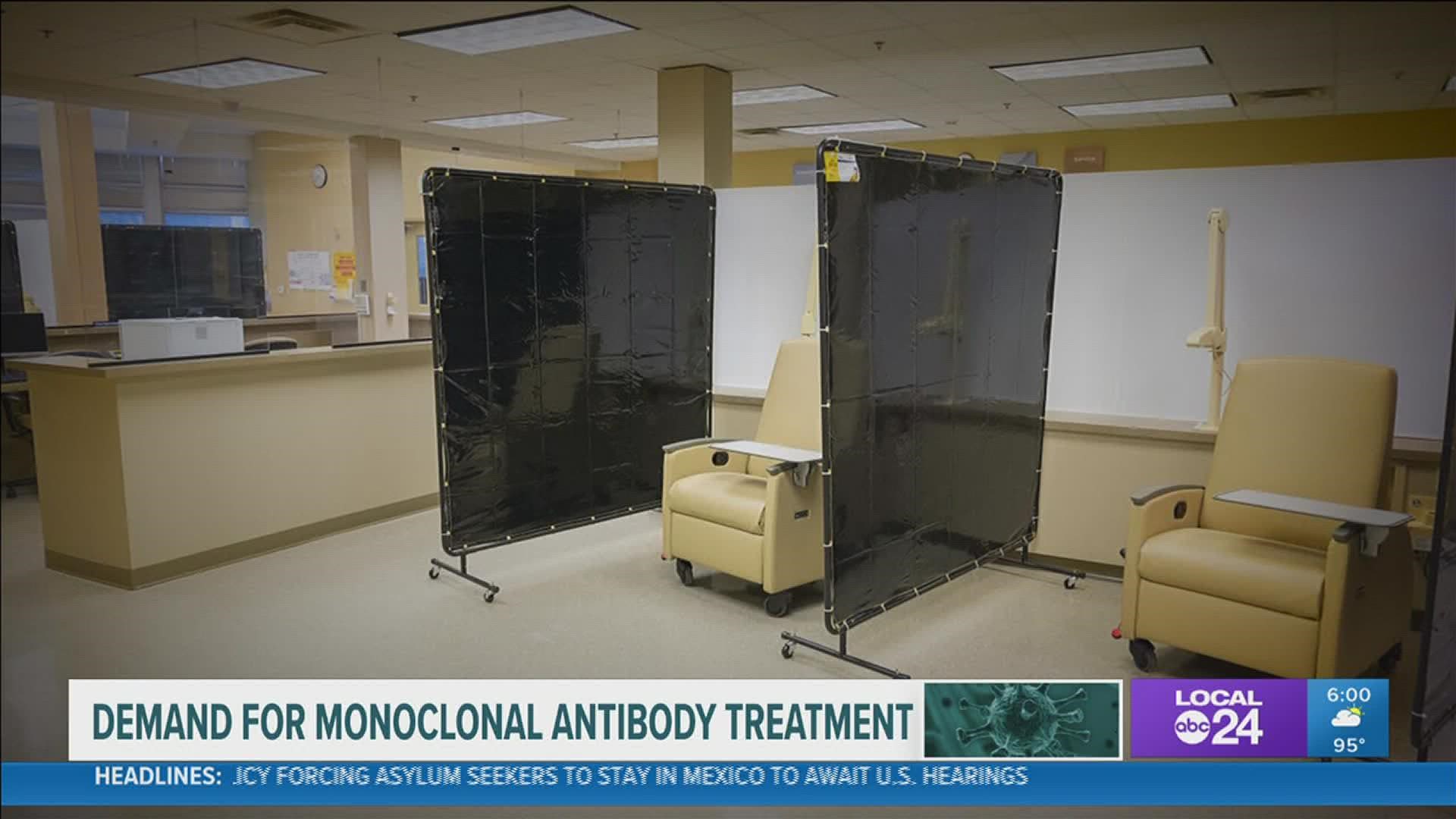MEMPHIS, Tenn. — If you have been exposed to COVID-19 and are considered high risk for COVID complications, you may be able get a monoclonal antibody treatment, even if you have not tested positive for the virus.
Earlier this month, the FDA authorized emergency use of REGEN-COV, an antibody therapy for people with known exposures. You can receive treatment even if you are not vaccinated.
Medical providers hope giving the treatment to those who are exposed will prevent a severe case of COVID-19 from developing.
Demand for monoclonal antibody therapy is skyrocketing. Medical providers in the Mid-South are trying to open more locations and increase the number of people they can treat per day to keep up with the demand.
"I was fully vaccinated with the Moderna vaccine back in April," said Dana Capocaccia, a COVID Survivor.
Despite his vaccination, Capocaccia said he still caught COVID-19 in late July. He was a breakthrough case.
"After about 4 or 5 days, I kept getting sicker - went to the emergency room," said Capocaccia.
Capocaccia said his emergency room doctor decided he needed a monoclonal antibody infusion.
"Unfortunately, they were so full they couldn’t get me in for three days," said Capocaccia. He was given the treatment on his eighth day of having symptoms.
"I didn’t really feel the effects of the infusion that day, but by the next afternoon, which was probably 30 hours later, I felt like different person. The majority of flu symptoms were gone," said Capocaccia, "By the 12th to 15 day, most the symptoms were gone. But even now - about 30 days - I still have taste issues and fatigue issues."
"Whether you have had the vaccine or not, and are at high risk for disease progression - which includes obesity, diabetes, heart disease, you name it - you can get antibodies therapy, and it works," said Dr. Scott Strome, UTHSC Executive Dean.
Dr. Strome said right now medical providers are working to set up additional infusion sites so there will be more locations for people to receive treatment.
Strome said when it comes to the antibody treatment, people who are COVID-19 positive are usually given an infusion.
A person who has not tested positive but had a known exposure can now be treated with a shot as a preventive measure.
Strome said he has heard claims of people saying they can't get in for treatments, but said there is enough medicine in our area. He believes there is a lot of confusion about the therapy, who can get it, and where it is being given. Strome said he hopes the confusion gets cleared up.
For example, the owner of ZupMed in East Memphis said they have had to refer several patients to medical facilities outside Memphis for treatment. Because after ZupMed sent orders to area hospitals to receive the treatment, the patients were told they could not get an appointment in the appropriate time frame at locations in the Memphis area.
The treatment needs to be given within 10 days of showing symptoms. One patient reported to us he was given a date for treatment 14 days out, so he instead went to Bolivar for treatment, where he could get in right away.
"If you can’t get in, we want to know, because we are working on expanding capacity across the city. We want everybody to be able to get in because this is a critical public health prevention strategy," said Strome.
"When I got sick, I knew within hours it was different than anything I had ever had before," said Capocaccia.
Capocaccia said he is thankful he got the monoclonal antibody treatment and the vaccine.
"I think if I wouldn’t have had the vaccination that I probably would not have survived."
Medical providers are trying to ramp up treatment. A spokesperson for Baptist Hospital said it can now treat 100 patients a day between its main hospital on Walnut Grove, Desoto, and Tipton County facilities.
Methodist Hospital reported it is now using national guard members to assist with providing the treatment. As of last week, since December it had given 1,500 treatments of monoclonal antibodies. It hopes to triple the number of daily infusions with the help of guard members.

